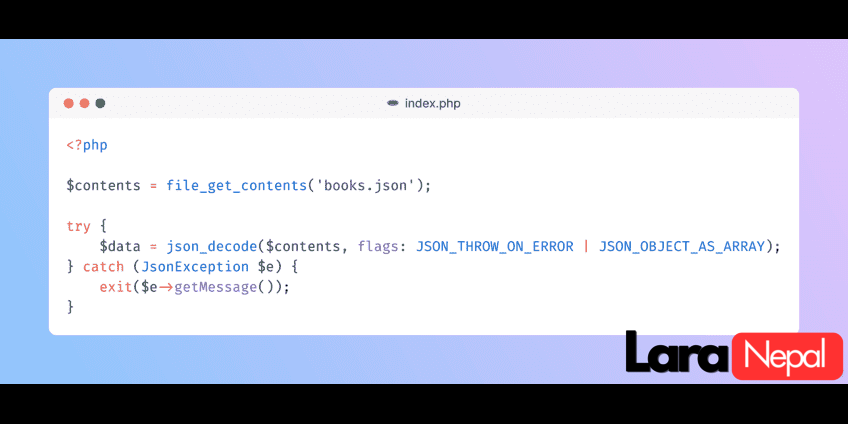Php Json Parsing Made Easy: Validate And Process Nested Json Data
Published on August 13, 2024 by Dinesh Uprety

Introduction
JSON (JavaScript Object Notation) is a popular data format used for exchanging data between a server and a client. In PHP, parsing JSON data is straightforward, but handling nested JSON structures and validating the data can be more complex. This article will guide you through the process of parsing, validating, and processing nested JSON data in PHP.
Parsing JSON Data in PHP
To parse JSON data in PHP, you can use the json_decode function. This function converts a JSON string into a PHP variable. Here's an example of how to read and decode a JSON file: books.json
[ { "title": "Fairy Tales", "pages": 100, "price": 3.99, "available": true, "language": null, "categories": ["children", "fiction"], "author": { "firstname": "Hans Christian", "surname": "Andersen" } }, { "title": "Gardening", "pages": 250, "price": 14.50, "available": false, "language": "en", "categories": ["education", "non-fiction"], "author": { "firstname": "Teresa", "surname": "Green" } }, { "title": "Space", "pages": 55, "price": 3.00, "available": true, "language": "en", "categories": ["non-fiction"], "author": { "firstname": "Teresa", "surname": "Green" } }]<?php $contents = file_get_contents('books.json'); try { $data = json_decode($contents, flags: JSON_THROW_ON_ERROR | JSON_OBJECT_AS_ARRAY);} catch (JsonException $e) { exit($e->getMessage());} var_dump($data[0]['title']);var_dump($data[1]['pages']);var_dump($data[0]['author']['firstname']); echo '<pre>';print_r($data);echo '</pre>'; ?>In this example, we read the contents of a JSON file named books.json and decode it into a PHP array. The JSON_THROW_ON_ERROR flag ensures that any errors during decoding will throw a JsonException, which we catch and handle gracefully.
Validating JSON Data
Validation is crucial to ensure the integrity and correctness of the data. PHP provides several ways to validate JSON data. One common approach is to check for errors after decoding:
if (json_last_error() !== JSON_ERROR_NONE) { echo json_last_error_msg();}However, using the JSON_THROW_ON_ERROR flag, as shown in the previous example, is a more modern and robust way to handle errors.
Processing Nested JSON Data
Nested JSON data can be more challenging to process. Here's an example of how to access and display nested data from the decoded JSON array:
<h1>Books</h1> <?php foreach ($data as $book): ?> <h2><?= $book['title'] ?></h2> <p>by <?= $book['author']['firstname'] ?> <?= $book['author']['surname'] ?></p> <p><?= implode(', ', $book['categories']) ?></p> <table> <thead> <tr> <th>Pages</th> <th>Price</th> <th>Available</th> <th>Language</th> </tr> </thead> <tbody> <tr> <td><?= $book['pages'] ?></td> <td>£<?= number_format($book['price'], 2) ?></td> <td><?= $book['available'] ? 'yes' : 'no' ?></td> <td><?= $book['language'] ?? 'unknown' ?></td> </tr> </tbody> </table> <hr> <?php endforeach; ?>In this example, we loop through the array of books and display their details, including nested data such as the author's first name and surname, and categories.
Conclusion
Parsing and validating JSON data in PHP is essential for building robust applications that handle data exchange efficiently. By following the techniques outlined in this article, you can confidently parse, validate, and process nested JSON data in your PHP projects.